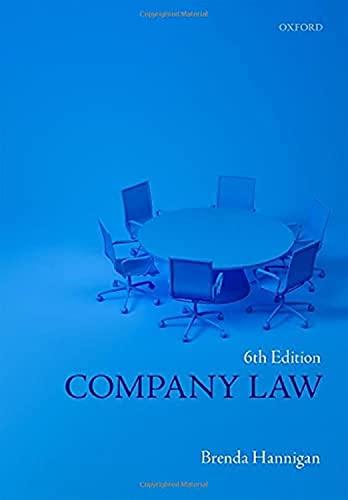Question
1 In law, anything attached to the land is part of the land itself e.g. a fence post driven into the ground 2 Buying land
1 In law, anything attached to the land is part of the land itself e.g. a fence post driven into the ground
2 Buying land under the Torrens system carries greater risk than buying land held under deed
3 The government guarantees good title to land bought under the Torrens system absent fraud
4 The owner of land under the Torrens system is whoever is named as owner on the Register in the
Land Registry Office and title transfers from vendor to buyer when the Register is altered
5 If land under the Torrens system is sold, it has a new owner when the Register is altered, not earlier
when the purchase price is paid to the existing owner
6 The Crown in New Zealand is virtually the government of New Zealand
7 Unless someone can show good title to land in New Zealand it must be owned by the Crown
8 In 1840 Mori had similar understanding of land ownership to the English system
9 All land bought from Mori in the first decades of colonial rule was bought fairly
10 The English in 1840 saw land as property which could be bought and sold owned by individuals
whereas Mori thought land was in their communal care to pass onto to future generations
11 The Torrens system of land ownership developed from a combination of a ship registration system,
the old English customary practice of copyhold, and a Roman-Dutch system of land transfer
12 Buying land under the Torrens system is riskier than buying land held under deed
13 In thedeed system of land ownership the deed document itself shows ownership of land
14 In the Torrens system of land ownership the Register at the Registry Office shown ownership
15 In the deed system of land ownership the deed shows who owns the land until someone else
can show they have better title
16 If Mori land was held communally under the care of Iwi in 1840, then a difficulty of the validity of its
sale and purchase was who in the iwi exactly had the necessary authority to sell it
17 An iwi was the largest political entity in pre-Treaty of Waitangi times and it typically comprised
several related hap which consist of family groupings or whanau
18 Land was at the root of problems between settlers, predominantly British, and Mori both before
and after the Treaty of Waitangi was entered into whereas sovereignty was not an issue
19 Because early Mori lacked writing being an oral society, when they discussed the Treaty document
before deciding whether to sign it, it is reasonable to assume they believed the writing confirmed
what they were told it meant and what effect it would have on them
20 The Treaty was written in both Mori and English with identical meanings of the two versions
21 A Treaty is a form of contract between states
22 The Treaty was short, to the point and a model of clarity with no alternative meanings possible
23 Under English law in 1840, when a contract is complete in its essential terms when reduced to writing
there is no need for pre-agreement material such as discussions to be considered, so once Mori
had signed the Treaty, what had been discussed beforehand was irrelevant in English law
24 If certain criteria are present in a negotiation then a contract may have come into existence which
will create obligations on the negotiating parties which are enforceable in court
25 If the same criteria are present as in the immediate statement above, but there is no 'intention to
create legal relations' present, then the obligations are only morally binding on the parties
- Please judge whether these are true or false
- This is about New Zealand law
- These statements are true questions to determine whether he is wrong or correct
Step by Step Solution
There are 3 Steps involved in it
Step: 1

Get Instant Access to Expert-Tailored Solutions
See step-by-step solutions with expert insights and AI powered tools for academic success
Step: 2

Step: 3

Ace Your Homework with AI
Get the answers you need in no time with our AI-driven, step-by-step assistance
Get Started


